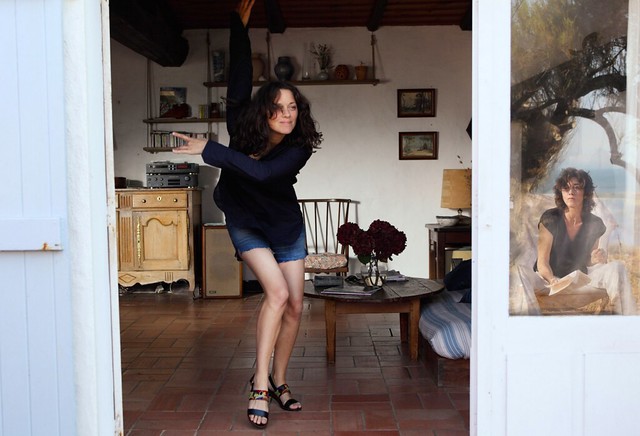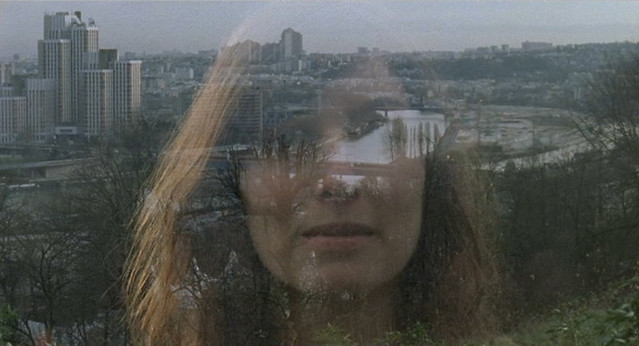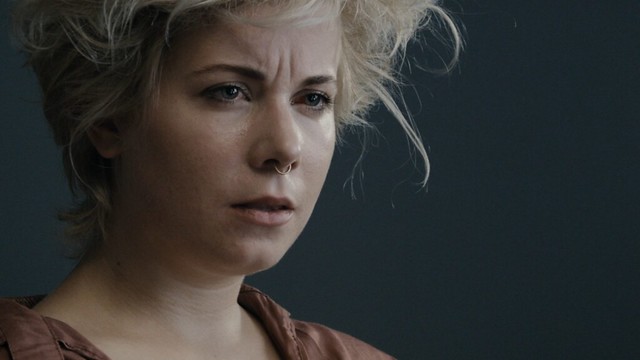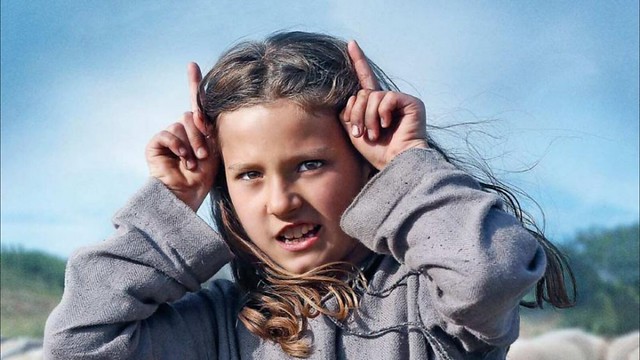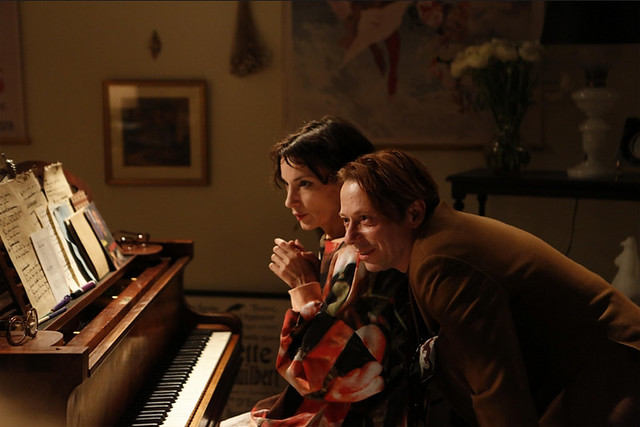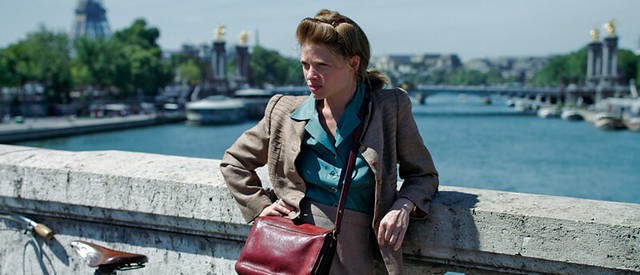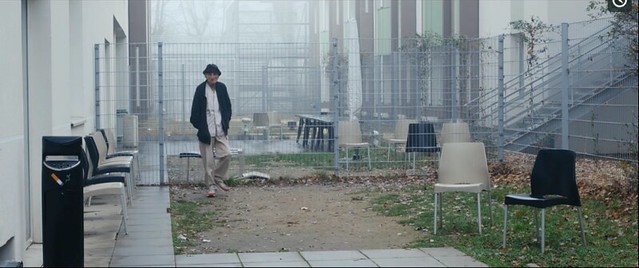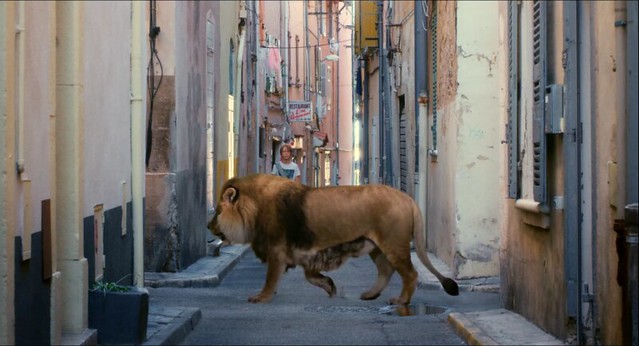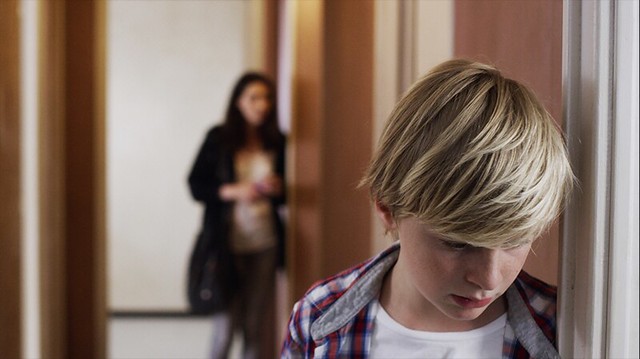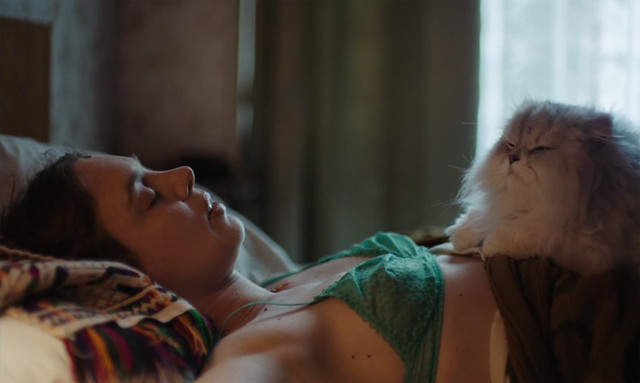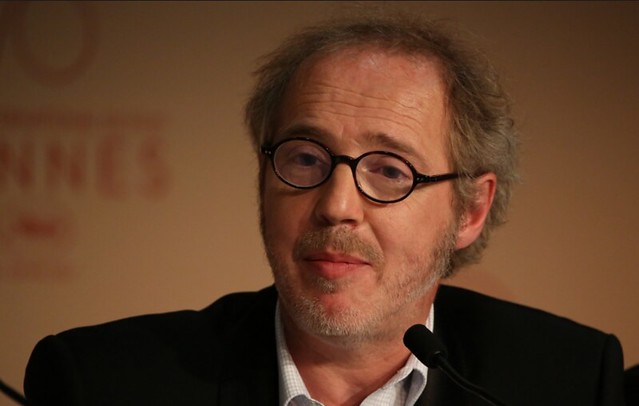
Arnaud Desplechin was in town for his new film Ismael's Ghosts opening stateside and I jumped on the opportunity to interview him again because I adored the film. Desplechin, as usual, is just as unpredictable and sprawling as his films in person. He loves to talk. And his enthusiasm for his love of cinema and his actors are infectious. Here is how it went this time:
So there are two cuts of the film. I’ve only seen the director’s cut. Can you tell me about the differences of the two? Are you happier that only the director’s cut is released in the States?
The thing which happened in France is that because I’m French, we could afford two versions of the film at the same time. So we had what I called the ‘strange’ version and we had director’s cut. So at the (Cannes) festival we showed the Director’s Cut and in the cinema we released the shortened French version. After that I just remembered that this line from Larry Gross, you know Larry Gross? He is a screenwriter and a film critic. He asked me what the meaning of the short version was, and he told me in a very patronizing way and I loved it: “My dear Arnaud, in terms of storytelling, this French version is a complete non-sense.” (Laughs) I’m not good at cursing. So all I could say was that we don’t have the trapanese in Tel Aviv and that there is no explanation why Ismael saying that his brother’s dead (which is a deeper problem). But he is alive again in the later part of the picture as he makes an appearance on the Skype chat. So you miss all that part. So I can say that French version was more focused on the love triangle. It’s like a popular fiction which is more sentimental and the other, longer version is more cerebral.
It’s the first time you have a protagonist who is a film director. Was this intentional?
I had one character already who was an artist in my films. He was in Kings and Queen. He was a violinist. It was an humble profession. For me, to make someone a violinist was a very transgressive thing to do because I feel much more comfortable with a doctor or a scientist or whatever to give to the character. But this time I told myself, I reached an age where I can say ‘screw it we will see what happens when I give a character a job of film director'. When I said that, my producer was not too happy, “come on, not the film director!” In my defense, film director is a humble one. Ismael never says that he’s a director. He’s just a humble filmmaker. Translated from French, film director is more like Film Builder (realisateur). It’s not really a word, the concept doesn’t exist in terms of filmmaking. The director in the film is Henry Bloom, the…cineaste as we say in French.
Ismael loves his job. You can see him struggling when not directing in the attic. Zwy (played by Hippolyte Giradot), the producer, the number guy, is the real director in that sense.
You are saying it’s not a self-reflexive movie just because the main character is a director?
Like Ismael Vuillard in Kings and Queen, who shares the same name as in this film, they are artists who are going too far. They are overdoing anything they are doing. They are both gross, insulting… ah (laughs) Ismael is the type of the director I would love to be because he allows himself to do everything I forbid to do myself. For Matthieu, he loved to be Ismael, he kept saying, “how can he do that? I’d never dare!” It’s something you think about doing but never dare to do it, like shooting your producer! (Laughs) That’s why we loved this character. He’s our little devil for Mathieu and I.
Thing I’ve wondered about is your fascination with espionage thrillers as they appear in your films.
My first feature Le Sentinelle was already a spy film. Even in My Golden Days, there is a elements of a spy film. I’ve always been interested in that kind of topics. I’m a big fan of Jean Le Carré, Robert Ludlum and even John Grisham. The title Ismael’s Ghosts, not to quote Norman Mailer, but as an homage, Harlot’s Ghost, which is a spy novel.
But I knew at the very beginning that I wanted to depict that this director would escape to the spy world while writing alone in the attic. That you will only have bits and pieces of the life of diplomat. And you will never know if he is a spy or a total idiot. You will never have the answer. It was a tribute to Broadway Danny Rose where you have bits and pieces of life and the agency of Broadway Danny Rose but you won’t have the whole story. So I knew that why he is writing about his brother being a spy because he is daydreaming about a man who disappear to the other part of the world.
But I still didn’t have the character of Ismael and I didn’t have a idea of a proper film. He is escaping but why is he escaping? I finally thought when I realized that his wife being disappeared for twenty years, him being a widower and her appearing again has a lot to do with his escape. Then I had the movie which was a movie in two parts - one part in the island with two women and the other in the attic.
Ismael, the same name as the one in Kings and Queen, and Daedalus again. this time Ivan.
I had to! Come on. What kind of names could I give? One of my character is inventing Daedalus for sure.
Not only three main actors, all of whom are wonderful, but I really enjoyed other great actors in this film - Hippolyte Giradot, Alba Rohrbacher and was good to see Catherine Mouchet. How was the casting process?
It’s a long process. It’s not the same as casting the main actors. But for Alba, it was a piece of cake. Because I had two monsters of French screen - Charlotte and Marion. I was thinking who could survive between these two such huge movie stars. I had to go with someone not French. But Alba is not only an incredible actress, she has such an incredible face, a face in a classical painting. She could be the wife of Louis or she could be the fiancee of Ismael. Ismael doesn’t have to settle with a ‘young newcomer’ you know? So avoiding the cliché of an old director dating a young woman, we have Alba, with her ageless, beautiful face like in a classical Italian painting! I was a huge fan of her work and that’s how I decided on her.
Catherine Mouchet, even the part was small, it was important for me to introduce her in the role because it was a key moment of transition from a comical scene where Ismael is tied to the bed to a pure melodrama. For that I needed to have a strong, well known face to have that jump from two different tones. It was also a tribute to her career. She has such an amazing face so I didn’t want to have just any doctor, but I wanted to have Catherine Mouchet!
And Hippolyte Giradot, I mean, we are good friends and he was great in Kings and Queen as a drug addict. In this film, when Mathieu is madness, Hippolyte is the reason. His character Zwy, is my favorite inside joke. Zwy Schomel - the name is so ultra Jewish. There are so many consonants no one could pronounce or spell his name, it was hilarious. Hippolyte is not Jewish and nor am I. We are both Catholics but we were educated by this Sephardic North African guy the ways of the Jews. We three were very close. So that element was kind of homage to this person, Pierre, we knew. I knew a bit about Ashkenazi community but when I arrived in Paris, I met Pierre and learned a lot about Sephardic Jews. Hippolyte knew the guy all his life, he knew his ways, so he created Zwy in Pierre’s image. It’s nice. Zwy says, ‘we are too old for this shit’, it reflects us, Hippolyte and I, getting old.
There are a lot of moving shots, zooming shots and intense orange colors. Especially the scene with Mathieu and Alba. Your cinematographer’s Irina Lubtchansky.
She is the daughter of William Lubtchansky (DP of countless French New Wave films including films by Agnes Varda, Jean Luc-Godard, Jacques Rivette and Philippe Garrel).
How did you and Irina go about creating the film’s look?
I don’t know how to say in America (talks to the interpreter), oh, a gel, in front of the lamps. It’s commonly known as the 'Storaro gel’. It’s a very specific one and the most expensive one you can have. Producers hate it when you want the Stroraro gel but I wanted to use it in that bedroom scene with Alba and Mathieu. Because you don’t know if its a dream or real. I wanted to add something magical in that scene so Irina and I both decided to go for the ‘Storaro gel’.
We used the same gel for the sunset in the beach house. It’s where Charlotte against the tree asking, “Do I sleep like a nun?” I was not supposed to shoot the scene that way, not at all. I had a totally different plan. We started with the emotion of that scene and i was sitting beside Irina and we had a long lens- it was supposed to be still and the reverse after that. It was pretty elaborate you know. But the performance she was giving to me was so intense that I took the zoom and started to move in without stopping. I was absorbing the scene brought on by Charlotte’s performance. We finished it that close (gesturing about a foot). So we did it. It was not the first take, it was 6th or 7th. I went to Charlotte and said, “This is it. you gave me everything you have. The scene is done.” It was never planned that way. Sometimes your actress and actors, mainly in my case, actresses, give me everything they have in their faces and I can’t stop capturing it. A face is such an amazing landscape, she really swallows the cinema at that moment.
There is a element of lost love and the love triangle that resonate to the romantics in me but the subplot of Jewish guilt/the survivor’s guilt, portrayed here by the great Laszlo Szabo really touched me. I’ve recently watched Memoir of War/La douleur by Emmanuel Finkel, based on the writing of Marguerite Duras. The pain of losing someone is so great that you lose the sense of self. Is it something you were exploring?
First of all, I love La douleur, I love the book and I love the film. All the actors are astonishing, every part of the film is astonishing. That is a very specific loss when you don't have the body to bury. It’s an endless one. I can mention a chapter in Sabbath’s Theater, the Philip Roth novel where the main character, when he was young marries this woman. Then she disappears. Its the war and you don't know if she is dead or not. She could be dead.
You have this father who is unable to moan her. So the suffering is always vivid. It is starting to be not as vivid as before for Ismael, because he just met Charlotte. Suddenly there is a second chance. For her dad, he is too old for that. There is guilt. If someone dies, someone dies. If someone disappears, it’s because of you. As Carlotta was saying, “You were too heavy,” She had a heavy father, so she had to escape to her fate. So there is a guilt in the character of Henry Bloom.
Carlotta comes back to her father on his deathbed. But there is no chance for her and Ismael getting back together is there?
I don't think so. Marion and I were discussing the script and trying different things. I think I just discovered something in the editing room, something Marion did without warning me and perhaps without knowing what she was doing: is that Carlotta the character is back on the island where she used to go with Ismael when she was young, she thinks, “I want my husband back.” It’s that simple. She is devilish, She is deliciously devilish with the dance scene with Bob Dylan song and everything. Then Ismael disappears. You realize that the second part of the movie, she doesn’t come back to get her husband, she goes back to her father. It seems to me that Marion plays a little devil in the first movement and she plays the second movement as a saint. I remember Pascal the producer saying to me after the first screening of a rough cut, “It’s strange that Marion has two faces,” and I thought that was the definition of great performance. I didn’t realized that when I was writing it, but Marion offered me that with her performance. I am really overwhelmed when I think about it.
Tell me if I am wrong but how I see the film is that in order to move on when you are in a rut artistically, you need a push from the ghost of the past.
Yeah yeah in a way. How can you run if you are stuck between Gainsbourg and Cotillard? But he does. He is running to his hometown and daydreaming about his film rather than actually making it. As he buys live hens to get eggs for breakfast, he has no love life any longer. (laughs) So he can just focus on his work.
Tell me a little about Roubaix, your hometown. You are very harsh on describing the town in the film. Is it as ugly as you say?
It’s the worst. My next film will be totally different. It will be about Roubaix. It’s about the social tolls of the town. It’s the poorest town in France. Where you have the most immigration population, mainly Algerians. One third of the population is wearing the veil, as you’ve seen that funny scene with Hippolyte in town. The first terrorist attack was in Roubaix during the Yugoslavian War. There was a riot and police was storming the houses with firehoses. It was really ugly. It's a really violent city.
The way I am painting it- more sweet and gentle, I’m trying to see the beauty of this ancient city. But it’s a nightmare as I’ve shown in that train ride scene. It’s my… what is that wonderful Canadian movie called...
My Winnipeg?
Yes, it’s like My Winnipeg. But the town is less richer than Winnipeg. 60 percent of the population is unemployed which creates violence. And there is no solution. All these people there are trapped in the merciless system. But I still have great tenderness for the city. I think it’s still beautiful and there are beautiful people living there. I have absolute anger and love for the city at the same time.
I’d love to see that movie. Very much looking forward to it.
Ismael's Ghosts is playing in New York's Quad Cinema and FSLC. The film will open in Los Angeles on 4/6. Please visit Magnolia Pictures Website for info on national rollout.
